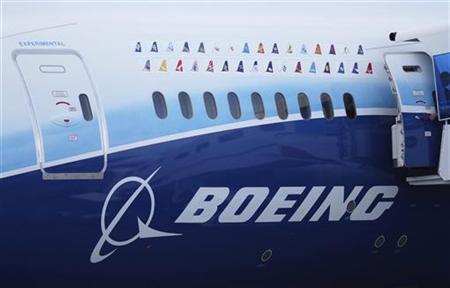Boeing earns $27,000 profit from selling aircraft parts to Iran

By Sara Rajabova
Boeing is reported to have gained as low as $27,000 worth of profit from selling aircraft parts to Iran since the Geneva interim deal was signed between the P5+1 group countries and the Islamic Republic in 2013.
Tim Neale, who leads communications for Boeing Washington, DC office, told Trend that the giant U.S. aircraft manufacturing company has sold one part and numerous manuals, navigation charts and other materials totaling $310,000 in revenue, generating a total profit of $27,000 by the end of 2014.
In July 2014 Boeing struck a deal with Iran Air to provide plane parts to the country’s flag carrier following a sanctions relief plan under the interim nuclear deal with Iran. Tehran was allowed the limited purchase of aircraft parts and repairs, but not aircrafts.
“We reported no transactions for the first quarter of this year. Any future transactions that occur going forward will be reported at the end of the second quarter (end of June), that is the requirement under which we are working,” Neale said.
He noted that the company’s current license permits only the sale of parts and information related to the safety of flight.
The license expires at the end of June, Neale said, adding it will be the U.S. government's decision as to whether or not it is extended beyond that date.
Major U.S. aerospace manufacturers, Boeing and General Electric, applied for export licenses in order to sell airliner parts to Iran following November 2013 deal. The U.S. Treasury department granted Boeing a license to sells spare parts for commercial aircraft to Iran in April 2014.As negotiations between Iran and P5+1 group of world powers staged progress, the license has been extended until the end of June.
Boeing was the first U.S. firm doing business with Iran since the U.S. embargo of 1979.
Neale further said the company is not speculating on business opportunities that might arise, if any, should sanctions be lifted further.
Recently, Martin Bentrott, Boeing’s vice president of sales in Middle East, Russia, and Central Asia, has said the company set its sight on the Iranian aviation market and expects a “very strong” demand in the country.
He said the company is hopeful through the negotiation process that could lead to a final nuclear agreement at the end of June.
Iran and the P5+1 reached a nuclear framework agreement on April 2 in Lausanne which raised hopes for achieving a comprehensive nuclear deal by June 30.
The deal provisions the removal of all international sanctions against Iran in exchange for the country scaling down its nuclear activities.
The Iranian aviation industry is under international sanctions. Western imposed sanctions have barred Iran from buying western aircraft since the 1970s.
Moreover, the U.S. Treasury has barred Iranian airlines, including Iran Air, from landing or operating in the U.S. Furthermore, extraterritorial U.S. sanctions prevent European airports from providing Iranian carriers with fuel or accepting their money.
The U.S.–led sanctions on aircraft and spare parts exports to Iran have left the Iranian airlines saddled with not only some of the oldest fleet in the Middle East, but in the world.
Iran's four largest carriers - Iran Air, Aseman Airlines, Mahan Air and Iran Air Tours - all have average fleet age above 22 years, according to the Iranian media outlets.
--
Sara Rajabova is AzerNews’ staff journalist, follow her on
Twitter: @SaraRajabova
Follow us on Twitter @AzerNewsAz
Here we are to serve you with news right now. It does not cost much, but worth your attention.
Choose to support open, independent, quality journalism and subscribe on a monthly basis.
By subscribing to our online newspaper, you can have full digital access to all news, analysis, and much more.
You can also follow AzerNEWS on Twitter @AzerNewsAz or Facebook @AzerNewsNewspaper
Thank you!
